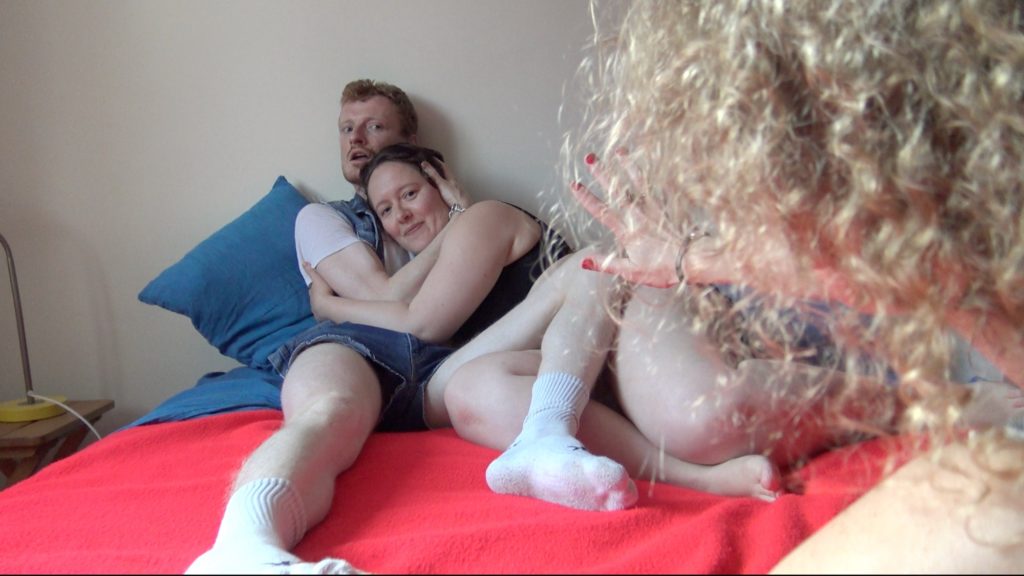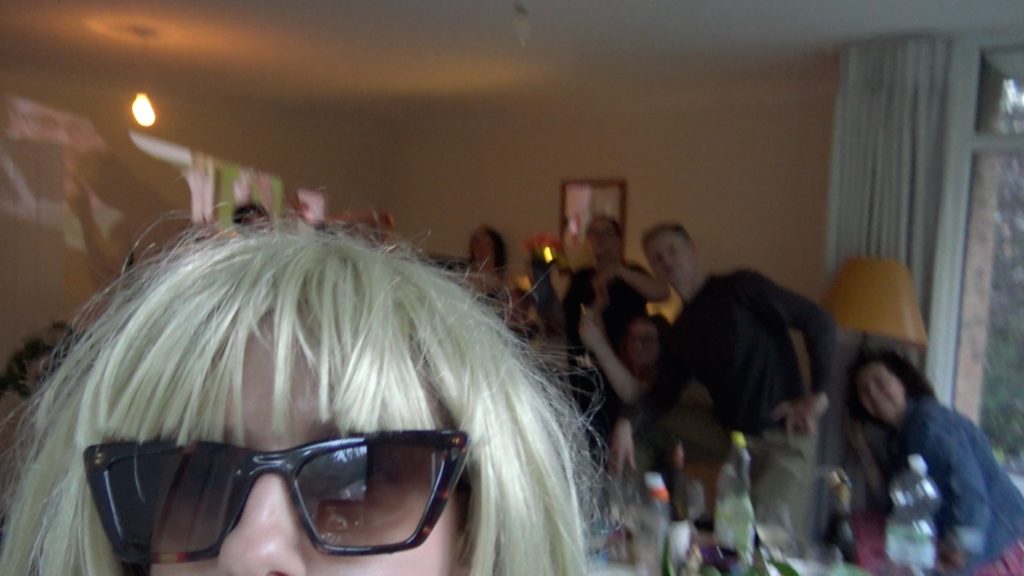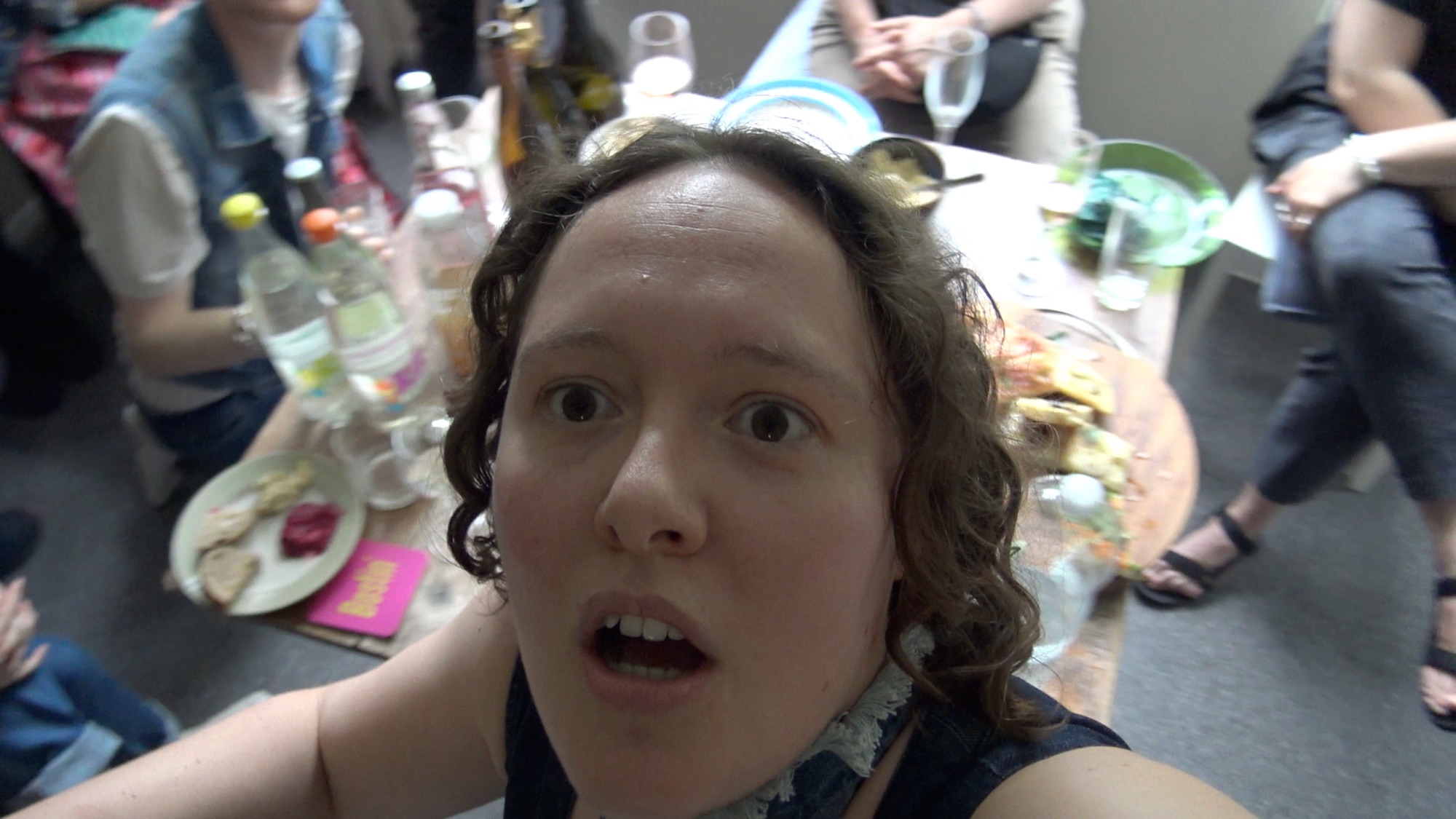Words by Paula Riofrio.
It was 5:58 and I was lying upon the moss covered roots. The invitation I received a couple weeks ago was clear: arrivals would start at 6pm. A woman crossed the walkway next to the tree, and by the chance of synchronicity, I was truthfully sure she was one of the invitees.
Orley opened the door, fully dressed in denim and wearing an absolute red lipstick. She escorted us to the balcony, where spaced-out music recreated the effects of a smoke machine, no need for chemicals. Paul shook my hand and asked me about my favorite type of glass. Rohanne danced in a blonde wig and dark spectacles. Many others arrived. Paul kept repeating “Have you met Paula?”, “Have you met Cath?”, “have you met, have you met, have…” not for too long, yet a tedious amount of times. Simon, tonight’s host, entered his own balcony as a guest. We had a short time to talk to one another before Rohanne, Paul, Orley and Sam, the performers, presented themselves.
It was not the wine, I was having the very first glass. It was the seriousness and the themes they had chosen to talk about, and how they were performed in dialogue with the audience’s interruptions. I curled myself in laughter with this one; a guest said: “What is Orley? A French airport?” “No, I am a person, clearly. She stressed the last word.
We were invited to share three words with a person we have not met before, and three words only. As far as I could find out, I was surrounded by dance scholars and gardeners. Talking to them was like opening a door in a vast corridor, where you could only see that which you already knew. Not long apart, we were separated into groups to explore around the flat.
Everything felt slightly normal; walls here and there, paintings nailed to the wall, a pile of bread baskets neatly organised. All the objects inside a house have a story, but strangers as we are, there were two options: ask Simon or imagine. I saw Simon’s tatami on the floor of his office, that one object connected to a whole utopian landscape. The feeling of it made me think of a cottage not away from the sea, a kind of cottage that is not actually a cottage but a covacha, with no glass windows, no mosquito nets, imaginary, idyllic.
The group decided to go to the living room. Everybody else was gathering in the bedroom where Orley sang a religious song, apparently. I couldn’t concentrate on that. Paul asked us to share something; none of us dared. He took the lead and shared a toast:
(looking at everyone’s eyes, one by one)
To all lovers love
To all lovers love
To all lovers love
Then the tone changed
All lovers love to
All lovers love to
I came back to the present after that tantrum, because he did start jumping on the bed. Lovers all love to, what is it they love? What do you love? Have we loved all I’ve needed to love? Bowie would wonder.
Dinner time, suddenly. Sam started her monologue about her gluten sensitivity and family issues, the kind of topics one tends to neglect at gatherings. Orley interrupted, carefully retaining the new information and improvising on her script. Both their complaints related to not being seen and not being heard. Care, organise, prioritise, concentrate; these activities are irremediably hard to balance, yet our lives make routes through its performance.

We were invited into the dancing room, Simon’s office, with scholarly playfulness. They had a choreography prepared for us. I can’t remember how, and definitely not why, but after the dance there were three scenes going on in different rooms of the flat. Paul grabbed my arm to talk to me about his lost flat in Berlin while I was on my way to the kitchen to figure out what Rohanne was doing on the floor. People were humming and holding plants in the living room; I thought I would fit perfectly in that room. I walked in and held onto the plant as one holds into a partner.
Performers start to sing a song unknown to me, Imogen Heap’s ‘Hide and Seek’. By the second time they sang “trains and sewing machines” I was already holding tears inside. Catharsis arrives at unexpected times. After that came a silence. Sam put on the blonde wig and picked out the audience one by one into a tableau. The camera that was going around throughout the evening stared at our silence for a minute and then it was shutted.

When you go to watch a performance you never think of putting into a different character. This time I contemplated the idea of doing so. We Move in Circles entwined life and performance: you enter the space as yourself but then you are included into a script that is meant to be a performance. It leaves you hanging on a cliff wondering, is it me talking, is it not? Later that day, on the train back to London, I spoke with part of the cast and some other guests. Rohanne agreed that one is always performing yet always revealing something that is not a performance. Is it what makes a character a truthful character, and what makes you yourself, the errors that zip through when the unexpected happens?
